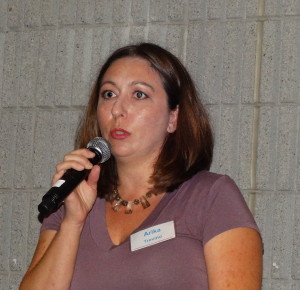Zip codes shouldn’t determine a child’s future, Nashville panel says

By Chris Butler | Tennessee Watchdog
NASHVILLE — Tennessee resident Arika Trevino told a panel of school of choice advocates in Nashville this week a tenured union teacher emotionally damaged her autistic son, now 9, when he was only in first grade.
“He was barely on the autism spectrum when he started, and that teacher, who was extremely abusive to him, took him to being non-verbal,” Trevino said.
“He went from being completely high-functioning to barely functioning. That teacher still has her job. She should never be around children — ever.”
GOOD CHOICE: Arika Trevino told a panel in Nashville this week that school choice helped her son immensely.
Trevino told people attending the Charles Koch Institute-sponsored event that her son now attends an online virtual public school academy and is again high-functioning.
“I have pulled him out from being non-verbal to back to being verbal,” Trevino said, adding the concept of school choice means the world to her.
“I fought with that school to the point of getting my state senator and my state representative as well as my federal representatives involved, but that school would not change, so I had to pull my kids out.”
While the majority of audience members appeared sympathetic to Trevino’s story, all weren’t on board with the concept of school choice.
Nashville resident Thomas Weber was one of them.
“What is your endgame here?” Weber asked four separate panelists representing various think tanks, in addition to Connecticut charter school Principal Steve Perry.
“Are you looking to destroy the public system that we have and build a new one based on your ideals? Reform candidates don’t win elections. Look across the country. The public has shown they don’t want a new public system.”
Perry, principal of the Capital Preparatory Magnet School, told Weber that many kids are already reading below grade level.
“If charter schools are proliferating it’s because the people are voting with their feet,” Perry said.
“These families don’t want you telling them where to send their kids to school. They want to make the choice for themselves. They have the capacity, the intellect and the will, and when they do they make that decision. It’s not for me to decide or for you, sir.
“The endgame is what the beginning game should have been — educate the kids and not keep grown people employed.”
William Fitzhugh, representing the Nashville chapter of Americans United for Separation of Church and State, posed a question.
“Instead of taking money from the public school systems, why not just make the public schools better?” Fitzhugh asked.
“Tennessee schools are funded by property taxes, so you have the wealthy communities with good schools and the poor communities with lousy schools. We’re concerned about depleting the original funding for the public school system.”
Perry said the best way to answer Fitzhugh’s question was with a question of his own.
SCHOOL CHOICE: The panel in Nashville, from left to right, included Stephanie Linn of the Friedman Foundation for Educational Choice; Jonathan Butcher of the Goldwater Institute; Steve Perry of Capital Preparatory Magnet School; and Justin Owen of the Beacon Center of Tennessee.
“Why hasn’t this happened?” Perry asked.
“What is stopping those schools? We’ve been feeding those schools our children for generations, and they haven’t done it. I’m not prepared to do any more experimenting.”
Panelist Justin Owen, president of the Beacon Center of Tennessee, told audience members that school choice benefits taxpayers; private schools can educate children at a lower cost when compared to public schools.
Owen also said charter schools, which are publicly funded independent schools, are more accountable.
“If a charter school is failing then it gets shut down,” Owen said.
“When is the last time you heard of a traditional public school getting shut down for poor performance? It doesn’t happen. If you have a choice program then parents will hold that school accountable.”
Owen bemoaned the idea of low-income families with children who are forced to attend schools that aren’t necessarily the best fit. These people also are less likely to have access to school-choice options.
“Right now a zip code determines where your child goes to school, and, frankly, I think that’s pathetic,” Owen said.
“We need to empower parents to make choices, and not some imaginary line or number.”

Thomas Weber, apparently not pleased with school choice concepts, asked a panel what their endgame is.
Panelist Stephanie Linn, with the Friedman Foundation for Educational Choice, said 300,000 students around the country already take advantage of school choice options through educational savings accounts, vouchers or scholarships.
Vouchers are government-funded and pay for tuition fees at a school other than the one a child is usually assigned to attend.
Some of those kids leave their old school simply because of bullying, Linn said.
“Is the purpose of public education to fund the running of schools or to fund the education of the public?” Linn asked.
Meanwhile, Jonathan Butcher, the education director with the Arizona-based Goldwater Institute, told audience members that school choice can benefit children with special needs other than autism, and that includes children with cerebral palsy.
“More people now know what vouchers and charter schools are. We have the next generation of these things to look forward to,” Butcher said.
Contact Christopher Butler at chris@tennesseewatchdog.org or follow him and submit story ideas on his official Facebook page.
Get regular Tennessee Watchdog updates through our Facebook or Twitter accounts
Click here to get Tennessee Watchdog articles sent directly to your email inbox (click Tennessee under “Watchdog News Updates)
Like Watchdog.org? Click HERE to get breaking news alerts in YOUR state!







